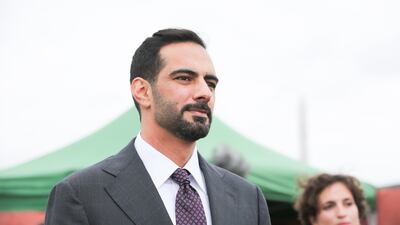Salem Al Qassimi has embarked on a new – and tough – challenge.
As the permanent delegate to Unesco, based in Paris, he's hoping to bring about global policy change through a burgeoning relationship between the UAE and the UN cultural agency.
Over the past three years, the Emirates has been steadily raising its donations to Unesco as it seeks to play a greater role within the cultural organisation.
“Since 2018, we've been one of the top 10 donors to Unesco,” says Al Qassimi, the former Assistant Undersecretary for the Ministry of Culture and Youth. “And since 2019, one of the top five."
the UAE's permanent delegate to Unesco
The UAE has had a long commitment to Unesco, funding two awards for education and Arab culture since the mid-2000s, but it has recently become more active. In 2019, the UAE joined the Executive Board for the first time, a rotating commitment that lasts for four years.
“We've reached the point where it’s not a question of what we can get out of Unesco but how we can serve member states and other countries within the Unesco overall framework,” he says.
For example, a draft resolution the UAE submitted was approved in April and will establish guidelines for international best practice in art education, culminating in a world conference on the subject that the UAE will help to plan for 2023.
“How can member states enhance their art education on a global scale? This is one of the priorities of the UAE that we've pushed for and we were very successful in taking it forward,” says Al Qassimi.
He was familiar with the Paris organisation from his time at the Ministry of Culture and Youth, when, in 2018, the government body announced its collaboration with Unesco to rehabilitate Mosul's Old Town in Iraq. This involves the rebuilding of the city’s famous Al Nuri Mosque, which was destroyed in the fighting with ISIS, as well as Al Saa’a Monastery and Al Tahera church, which testify to Mosul’s long religious diversity. The $50 million project is set to finish by 2023; designs have been selected for Al Nuri Mosque and most of the rubble has been cleared from Al Tahera church in preparation for its reconstruction.
“This is not only a structural renovation project,” says Al Qassimi. “We’re bringing the centre of Mosul to life. This is where the community is, and we wanted to ensure that the people contributing towards this project are the youth of Mosul. Most of the architects and builders are from Mosul to make sure that this is a truly local project that rebuilds the whole community.”
Why the UAE's involvement is important
Unesco was founded in 1945 as a specialised agency of the UN. It is funded by member states and runs educational and civic programmes alongside its work in heritage conservation, which it is best known for. Its World Heritage List keeps track of tangible and intangible cultural heritage that is perceived to be of world value, from Angkor Wat in Cambodia to tribal snake-charming dances in Rajasthan, with plenty more in the Arabian Gulf.
However, the organisation has also sustained criticism. It has weathered accusations of putting its internal bureaucracy over on-the-ground efficacy and of a tendency to focus on European and US sites and practices over those of the Global South. This makes the keen involvement of countries such as the UAE particularly important in determining policy objectives.
Al Qassimi says, for example, that building practices in the UAE and Gulf countries differ from those elsewhere in the world, in terms of materials, practices and environmental factors. The Ministry of Culture and Youth has now set up a working group to typify modern architecture in the Gulf, in order to implement preservation practices at a federal level.
Via Unesco, Al Qassimi will help to bring this updated sensitivity to Paris to argue for a wider understanding of what constitutes preservation-worthy modernism globally.
Sustainable goals
Al Qassimi is also working in line with the UN’s sustainability goals to further the sustainable building materials project initiated by Wael Al Awar and Kenichi Teramoto at this year’s National Pavilion for the Venice Architecture Biennale.

For Wetland, which was awarded the festival's prestigious Golden Lion award, Al Awar and Teramoto looked at the problem of excess brine, a byproduct of the UAE’s desalination plants. Rather than it re-entering and damaging the country’s wetlands, they proposed using it as a building material that offers an environmentally sustainable alternative to concrete.
“It’s not just the case that we won the Golden Lion and pat ourselves on the back and work on the next one,” says Al Qassimi. “The research needs to continuously grow because of how the curators found a possible solution to an environmental catastrophe. The UAE is the third-largest desalinator in the world – before us, Saudi Arabia and the US. There's a lot that we could work together with member states on taking this research forward to the relevant others.”
As climate change becomes a major threat to cultural heritage, the scientific remit of Unesco might well emerge as its most important – a factor enshrined in the UN’s 2030 Sustainable Development goals and elevated, Al Qassimi says, by the UAE.


